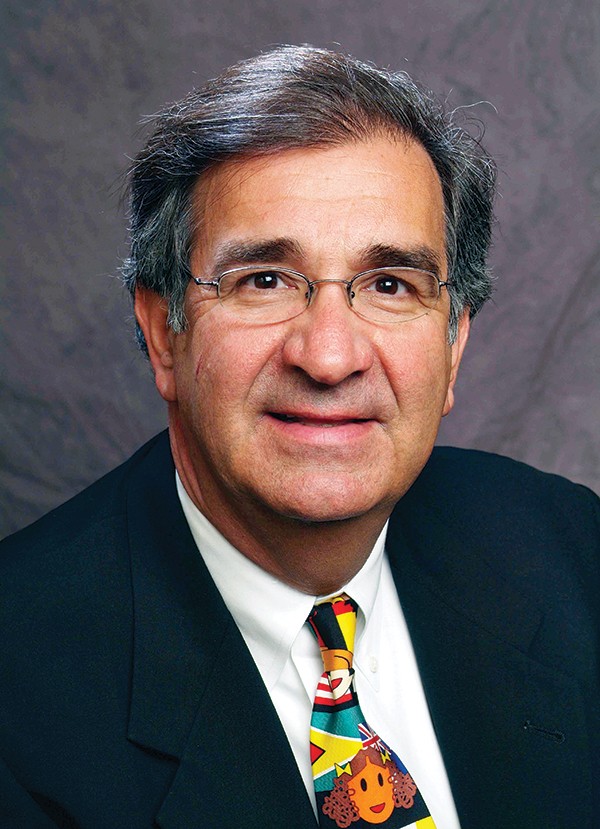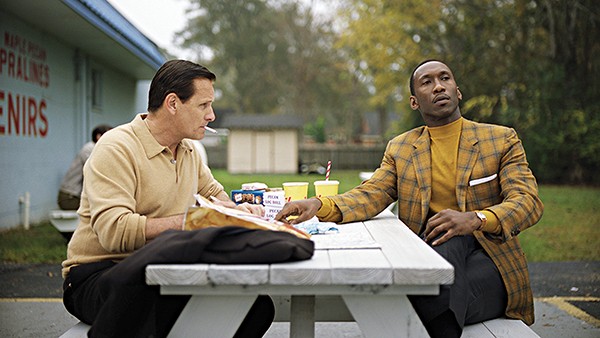They don’t want to talk about it. They say they can’t talk about it, in fact. Leaders with the Children’s Museum of Memphis (CMOM) say a non-disclosure agreement prevents them from talking about how and why Richard “Dick” Hackett, the museum’s former executive director and former mayor of Memphis, left the organization in June 2017. In an off-the-record meeting with leaders last week, they said they have nothing to hide but refused to talk about a formal investigation at the museum last year or that non-disclosure agreement.
“The board of directors and leadership at CMOM are excited about our future and have no interest in revisiting the departure of prior CEO Dick Hackett two years after the event,” interim CMOM executive director Reed Cochran said in a statement written on behalf of the museum’s board.
Leaders said they “would be more than happy to discuss” the one-year anniversary of the carousel restoration, new board members, new programming, and the museum’s upcoming search for a new, permanent executive director. The future seems bright, inviting, and brimming with promise, like the museum itself.
 Justin Fox Burks
Justin Fox Burks
But a group of former CMOM employees formed an organization called “21 Voices,” and described turmoil behind the scenes, particularly during Hackett’s years. They cite nepotism, casual racism, and sexism — a good-ole-boy’s club with frat-house rules, bloated paychecks, and random bonuses. They claim Hackett made adversarial employees “sweat” if they crossed the boss or his friends. They complain that long-time staffers who had just helped CMOM win an important, national accreditation were fired for seemingly little cause.
Members of the 21 Voices group say they petitioned the CMOM board, but the board didn’t listen. Group members said only when they threatened to launch a formal complaint to the national accreditation group did the board hire an external investigator, get some facts, and, eventually, part ways with Hackett.
It’s a much different story than Hackett told at the time. In an interview with the Memphis Daily News‘ Bill Dries in May 2017, Hackett said he was stepping aside and simply shifting his focus to fund-raising.
“I’ll shift my emphasis to, on my own, raising money for the Carousel building,” Hackett told Dries. “It’s two businesses and there’s no way one person could do both.”
Scroll to the bottom of that story online, though, and you’ll find comments pointing at that other, darker narrative. (The Daily News only allowed comments through a Facebook plug-in, so, the names and people are who they say they are, on Facebook, at least.)
“He [was] nothing but a leech off the museum,” wrote Loni Wellman. “You should really be thanking the staff — who he has forced out. Look at the 990s.”
Wellman’s LinkedIn profile says she was the program manager at CMOM from 2007 to 2011.
“Evidently he will continue to leech and plunder as a ‘consultant,'” wrote Amanda McEachran LaMountain. “And, yes, please look at the 990s, although they only paint an incomplete picture of the racism, nepotism, and general incompetence that Hackett’s ‘leadership’ represented.”
LaMountain’s father was Angus McEachran, former editor of The Commercial Appeal and also a former board chairman of CMOM.
“He claims to have made the decision to resign on his own,” wrote Jim Hyde. “Strangely, it was made just after the organization, 21 Voices, forced the board of trustees at CMOM to conduct an investigation into their claims of racism, nepotism, sexual discrimination, and workplace bullying.
“The board at CMOM chose to tell 21 Voices that Hackett would resign due to money problems and refused to address the issues that were investigated nor will they discuss the investigation conducted by [Burch], Porter and Johnson,” wrote Hyde. “Sounds like 21 Voices were correct in their beliefs. Hey CMOM, how about some transparency?”
CMOM leaders say they are transparent, and a Charity Navigator document provided to the Flyer last week gives the museum a four-star ranking (its highest) on accountability and transparency and a score of 100 out of 100.
Hackett retired from CMOM in June 2017. By September, he was the new executive director at Catholic Charities of West Tennessee, the service arm of the Catholic Diocese of Memphis, which serves 21 counties in West Tennessee. In a guest column in The Commercial Appeal in October 2017, Hackett said, “I feel closer to God every day I walk into our building or deliver a meal to a disabled Veteran or senior.”
Hackett said he is “proud of my body of work at CMOM” and “with the help of employees, board members, and generous donors, we were able to bring CMOM from the brink of closing its doors to a thriving, nationally accredited museum.
“All of the changes that I made, my personnel decisions, and my management approach were approved by the numerous members of the board of directors, respected members of our community,” Hackett added. “I am well aware of the false allegations made by a group of former employees and I am aware of some of their criticisms that sound [word missing] in reality but are misunderstood by the group.”
Back to the Beginning
Planning for the Children’s Museum of Memphis began in 1985, led by a group of three women — Mars Child, Polly Glotzbach, and Harriet McFadden.
The Boston-grown and Harvard-educated Child moved to Memphis in 1984 and wanted to see a children’s museum reflecting her childhood here. About the same time, Memphis native McFadden read about Boston’s children’s museum in an in-flight magazine, flew north to see it herself, and decided she wanted a similar museum in Memphis.
“It was there that a Boston museum trustee told Harriet about Mars’ interest in the same idea and that Mars was in Memphis,” reads a section about the women on the Women of Achievement website. “Was it fate? Coincidence? Magic?”
Others pointed the two women to Glotzbach, a Vanderbilt graduate and former Junior League of Memphis president who had toured the children’s museum in St. Louis.
In 1987, the three incorporated the Children’s Museum of Memphis as a private nonprofit organization. The next year, the three “found a friend in [then-Memphis Mayor Dick Hackett] who helped them find the old [National Guard Armory]” complex on the MidSouth Fairgrounds, according to the Historic Memphis website.
In 1988, the museum signed a 25-year lease with the city of Memphis on the complex, paying $1 a year. Tax documents show the lease was renewed in 2000 for $1 a year for the next 37 years. Another CMOM tax document puts the worth of the buildings at $10.1 million. A 2016 audit document put the annual fair value of the $1 rent at $324,378.
The three founders raised $3 million for construction, and the museum opened to the public on Saturday, June 16, 1990. Eleven years later, CMOM had raised $7.2 million for an expansion project that added 16,000 square feet to the museum. The expanded museum opened on August 3, 2001.
In 2013, the museum opened its H2Oh! Splash Park. In 2014, it opened the Outdoor PlaySpace.” In 2015, the museum agreed to restore the 1909 Dentzel Grand Carousel and opened the $4.5-million Grand Carousel Pavillion in 2017.

Richard “Dick” Hackett
Hackett History
Hackett looms large in Memphis history. Elected mayor at age 33 in 1982, he was the youngest mayor of a major U.S. city. He was elected three times by Memphis voters. He made history again in his incredibly narrow loss (by only 172 votes) to the city’s first African-American mayor, W.W. Herenton, in 1991.
Hackett reduced the city’s debt and only raised taxes once during his term in office. He appointed African Americans to some of the city’s highest offices, including James Ivey as Memphis Police Department’s first African-American director, and Greg Duckett as chief administrative officer.
Hackett also founded Wonders: The Memphis International Cultural Series. He served as senior vice president at the American Lebanese Syrian Associated Charities (ALSAC), the fund-raising arm of St. Jude Children’s Research Hospital. Hackett served on the board for Christian Brothers High School, the Wesley School for Children, and more.
In July 2006, Hackett was named CMOM’s chief executive officer, the third in the organization’s history. As mayor, he’d helped the museum secure the $1-per-year lease deal on the old Armory buildings.
“It is great to again have Dick as an important part of the museum,” Angus McEachran, CMOM board of trustees president, said in a statement at the time. “He brings a wealth of knowledge, expertise, and contacts to catapult the museum to an even higher level of excellence.”
By the Numbers
Maybe the first public red flag of Hackett’s turn at the CMOM helm came in a regular, annual financial audit of the museum in 2014 by Zoccola Kaplan, PLLC.
“The museum routinely utilizes a vendor who is a relative of the Chief Executive Officer for various repairs, maintenance, and capital projects,” reads the audit. “For the year ended June 30, 2014, the vendor was paid a total of $46,581 by the museum.” That same line is in audits for 2015, 2016, and 2017.
CMOM’s 990 for that year explains the payment was made to Mark Hackett, the CEO’s brother. The next year, Mark Hackett was paid $69,022 for “improvements to exhibits.” The next year, Mark Hackett was paid $106,031, a figure higher than the salary of the museum’s Chief Operating Officer.
That year, too, Jason Hackett, Dick Hackett’s son, was paid $23,600 for “improvements to exhibits.” In 2016, Mark Hackett was paid $81,567, and Jason Hackett was paid $19,739. For all of this, the tax documents say “the conflict of interest disclosures are updated annually and monitored by the board of directors.”
“Those who criticize this decision fail to recognize, or perhaps do not even know, that my brother’s value was his ability to get most of his building materials donated in-kind by his supplier contacts,” Hackett said. “I feel the decision to hire him was because this benefit outweighed any appearance of nepotism.”
Further, Hackett said knowing his brother offered “additional assurance of character and decency over and above background checks and references.”
“You can never be too careful about who is around children,” he said. “Safety and protection of our child patrons was my No. 1 priority.”
During that time, Dick Hackett saw his salary and benefits package increase, too. In 2014, he had a pay package worth $268,495. The museum employed 61 people that year and ended the year $132,120 in the red, according to tax documents.
Revenues in 2015 remained largely flat over the previous year ($2.6 million in 2014 to $2.7 million in 2015) though the museum had shed 18 employees. Hackett’s pay and benefits package rose to $305,521, including a $20,000 bonus from the board. The museum ended 2015 in the red by $234,762, according to tax documents.
In 2016, revenues were slightly down ($2.6 million), and the museum added one employee for a total of 44. Hackett’s pay package swelled to $328,569, which included a $45,000 bonus from the board.
CMOM explained in tax documents that “the board of directors annually reviews CEO compensation paid within the industry and inside and outside the area.” Hackett’s pay was approved by a CMOM compensation committee and the full board of directors.
In 2016, Jackson’s Mississippi Children’s Museum, with revenues of $4.7 million and 92 employees, paid its president and CEO Susan Garrard $129,288. In 2015, Thinkery, the Austin Children’s Museum, with 80 employees and revenues of about $5 million, paid its CEO, Troy Livingston, $108, 446. In 2015, the Brooklyn Children’s Museum, with 135 employees and about $5 million in revenues, paid its president and CEO, Stephanie Hill Wilchfort, $204, 711. All of this is according to these organizations’ 990s.
Another, non-Hackett-related anomaly found in tax records is on a form CMOM filed with the Community Foundation of Greater Memphis’ nonprofit search site, wheretogivemidsouth.org. The document has warning asterisks emblazoned around the words “Do Not File” and “Not Open to Public Inspection.”
But CMOM officials did file them with the Community Foundation, and one document in the latest 990s shows payments to the museum from what the Internal Revenue Service (IRS) calls “disqualified” people, “any person who was in a position to exercise substantial influence over the affairs of the [nonprofit organization] at any time during” the reporting period.
These documents show John Dobbs made payments to the museum of $10,775 in 2014, $320,000 in 2015, and $10,000 in 2016, while his wife Katherine Dobbs was listed as a CMOM trustee. Another CMOM trustee, Dick Tillman, made a $19,870 payment to the museum in 2016, according to tax documents.
 Justin Fox Burks
Justin Fox Burks
21 Voices
Public numbers tell one part of the story. For the day-to-day, we’ll turn to interviews with three former CMOM employees who said they left or were forced to quit during the time after the museum won its national accreditation from the American Alliance of Museums (AAM). Twenty-one of those employees formed 21 Voices to draw attention to Hackett’s behavior.
In a January 2017 letter to the CMOM board, the 21 former employees said “Hackett repeatedly engaged in behavior with staff and visitors that is unacceptable to a man in his role as CEO.
“The behavior has also been witnessed by museum visitors, donors, and others who have had to deal with him,” reads the letter, noting the complaints are backed by documents and recordings. “The complaints include sexual harassment by other staff members, unprofessional behavior, intimidation, verbal abuse, gender, racial, and age discrimination, conflicts of interests, and nepotism (hiring friends and family members — all white males).”
CMOM leaders discounted this narrative last week. But when asked for their side of the story, they would not comment, pointing to the terms of the investigation and the non-disclosure agreement.
But in May 2017, 21 Voices received a letter from then-CMOM board chairman Jon Bascom. It said Hackett would retire on June 15th and “will cease being an employee of the museum.” However, the museum had taken on a debt load of $4.5 million for the Carousel building. So, the museum would keep Hackett as an independent consultant, given his “significant experience in fund raising.”
“We appreciate your desire not to harm the museum and that is a top goal of the board as well as paying for the expansion,” Bascom said in his letter. “Due to confidentiality and attorney-client privilege, I am not at liberty to discuss any details of the investigation or the resulting actions. I hope you understand.”
Bascom said it had been a “trying year so far for the museum” and that “this begins a new chapter for CMOM on the road to being ever bigger and better.”
“For years and years, we’d see [Hackett] doing something dirty but he might do something dirty to one person at a time,” said one former employee. “It was in 2016, he really messed up. He built an army against himself. I knew we were the last bit of defense for the museum. So, I started organizing all the people he got rid of.”
One employee was told not to come out of the basement. But the person worked with the exhibits, which were, well, upstairs.
“I was forced to quit,” the employee said. “I was called up out of the basement and they said, ‘Are you ready to sign a deal?’ What was I supposed to do, wait until they fired me and there was no deal?”
As the employee tells it, the banishment came because the person helped a fellow employee (one whose English wasn’t very good) to write a resume to get a new job. The employee had been a CMOM employee for nine years without a raise, the person said.
“Once I got him that job, they really came down hard on me,” the former employee said.
That was a classic Hackett move, according to another former CMOM employee.
“He’d strip away your job duties and say, ‘we’re not doing this anymore,'” another former employee said. “Then, you’re just sort of sitting there. Then, he tells the board you’re not doing anything.”
The employees also told of Hackett’s practice of hiring his fellow Mississippians for jobs at the museum, people he “knew from the gym” or knew from restaurants. They described a team of cronies built around Hackett who felt they could not be fired, “because of their relationship with Dick.”
It created a work atmosphere that the employees said allowed for racist remarks to go unchecked. One employee recalled a Martin Luther King Day event in which Hackett proclaimed the museum didn’t “have enough black people working here” and offered the employee $250 “for every black person you find and we hire.”
Another employee recalled Hackett and the museum’s senior staff gathered around a security monitor waiting to watch a gag. A male employee was to wait until a specific female employee stood close to him and he’d make a show of pulling down his pants in front of her, an an attempt to make the woman feel uncomfortable and to delight his buddies watching on the monitor.
Another female employee lodged a sexual harassment complaint at a Hackett-hired employee. The woman was sent home. Later, she was told she could some back to work, but Hackett said to “make her sweat,” according to another former employee.
During this period, one former employee decided to speak directly to the board. The person remembered that, according to the CMOM employees’ handbook, employees were covered under the federal Whistleblower Act. The person said they made the request to speak and the request for protection to Cliff Drake, then the museum’s COO. While Drake said he’d get back to the person, he never did, the person said.
“That’s the whole thing,” the former employee said. “We didn’t really have human resources because Dick controlled [Drake], and he controlled [now Chief Financial Officer Randall McKeel], and [current COO Art Davis]. He controlled them to where they did whatever he wanted them to do.”
Hackett said he is a “reformer” and his employers, including the people of Memphis, “hired me to make necessary changes for the greater good.” He said it’s not “an enviable job” and one that often “draws the ire of those who wish to maintain the status quo.”
“I’ll be the first to admit that I am not easy to work for,” Hackett said. “I ask for a level of dedication and hard work that some cannot give. I can be harsh.
“In our society today, too often our leaders refuse to admit their humanity. I am human. I am not perfect. I hope that someday those who have criticized me will come to realize that my intentions were always good and with the aim of bettering the lives of the children that we served.”
21 Voices went somewhat public recently in an attempt to block McKeel from becoming CMOM’s new CEO in an undated petition at change.org. In it, Jim Hyde says, “our organization, 21 Voices, has helped remove the former CEO of CMOM, Dick Hackett, and we’re glad to see this necessary change.”
To get there, a former employee said they contacted the AAM, the group that had awarded CMOM its national accreditation, to lodge a formal complaint. The person was told by an official at AAM that many times change could happen by just simply letting board members know that the accrediting agency had been contacted with a complaint.
“We hold the future of your accreditation in our hands and we’re watching you,” described the employee. “Just to give them a warning shot.”
That move spawned an investigation by Lisa Krupicka, an attorney with Birch, Porter and Johnson, a former employee said. Krupicka said she could not share a copy of her investigation. Sometime after that, Hackett and CMOM parted ways. When asked for an interview about this story, CMOM’s current interim director Cochran said “an interview is unlikely due to the non-disclosure agreement related to the separation.”
 Justin Fox Burks
Justin Fox Burks
Looking to the Future
In March 2018, the CMOM board hired Stephanie Butler, a graduate of Rhodes College and Columbia University who had been the Chief Strategy Officer with the United Way of the MidSouth, as its new executive director.
Butler told Daily News reporter Don Wade in March that her vision was to “… open the museum up to the community” and that she wanted the museum “to be a town square for early childhood education.” Butler left nine months later, in November.
In her time there, Butler expanded the educational programming offerings at CMOM, including bi-weekly story times, movement classes and sensory play opportunities for toddlers, created a new “Night at the Museum” evening event, and created the “Experience Wakanda” day, featuring Marvel’s Black Panther.
Executive Director Reed Cochran will lead the museum until a new, permanent director can be found. A national search is expected to commence in spring 2019.
 Joe Royer
Joe Royer  Justin Fox Burks
Justin Fox Burks 
 Justin Fox Burks
Justin Fox Burks  Justin Fox Burks
Justin Fox Burks 

 Novel
Novel  Joey Miller.
Joey Miller.  Joey Miller.
Joey Miller. 
 Memphis Medical District Collaborative
Memphis Medical District Collaborative 

 Larry Kuzniewski
Larry Kuzniewski  Larry Kuzniewski
Larry Kuzniewski